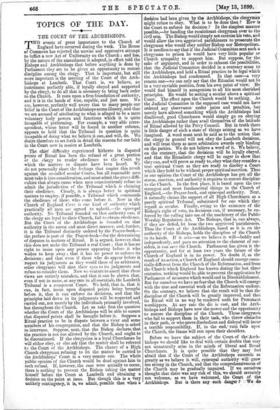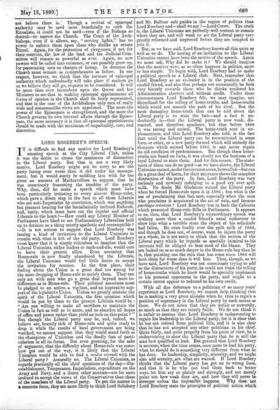TOPICS OF THE DAY.
THE COURT OF. THE ARCHBISHOPS. TWO events of great importance to the Church of England have occurred during the week. The House of Commons has rejected the unwise and oppressive attempt to inflict a new Act of Uniformity on the Church ; and has, by the nature of the amendment it adopted, in effect told the Bishops and Archbishops that before anything is done by Parliament they are to be given an opportunity to restore discipline among the clergy. That is important, but still more important is the meeting of the Court of the Arch- bishops . at Lambeth. That Court is, we believe, an instrument perfectly able, if loyally obeyed and supported by the clergy, to do all that is necessary to bring back order to the Church. It rests upon a firm foundation of authority, and it is in the hands of wise, capable, and just men. M e are, however, perfectly well aware that to many people our belief in the Court of the Archbishops seems illusory, and that we are accused of attributing to what is alleged to be a mere voluntary body powers and functions which it is quite incapable of performing. For example, a very able corre- spondent, whose letter will be found in another column, appears to hold 'that the Tribunal in question is quite incapable of doing what we believe it can, and will, do. We desire therefore to set forth in detail the reasons for our faith in the Court now in session at Lambeth.
The chief difficulty experienced hitherto in disputed points of Ritual hag been the refusal of a great portion of the clergy to render obedience to the Court by which the matters in dispute have been heard. We do not personally share the feelings that inspire this revolt against the so-called secular Courts, but all reasonable men must take it into consideration; and must admit the grave diffi- culties that always ensue when men conscientiously refuse to admit the jurisdiction of the Tribunal which is claiming their obedience. Clearly, it is always better in spiritual matters to employ, if possible, a Tribunal which commands the obedience of those who- come before it. Now in the Church of England there is one kind of authority which practically all men arc agreed to uphold.—the episcopal authority. No Tribunal founded on that authority can, if the clergy are loyal to their Church, fail to obtain obedience. But the Court of the Archbishops is founded on that authority in the surest and most direct manner, and, further, it' is the Tribunal distinctly ordered by the Prayer-book- the preface is part of the Trayer-book—for the determining of disputes in matters of Ritual. It is argued, however, that this does not make the Tribunal a real Court ; that it has no right to insist upon any person appearing before it who wishes to keep away ; . that it has no power to enforce its decisions ; and that even if those who do appear before it respect its judgments as they would those of an arbitrator, other clergymen will shut their eyes to its judgments and refuse to consider them. Now we venture to assert that these views are entirely mistaken, and that it can be shown that, even if not in name, at any rate in all essentials, the Lambeth Tribunal is a competent Court. We hold, that is, that it can, in fact, insist, upon disputed points being brought before it, that it can enforce its decisions, and that the principles laid down in its judgments will be respected and carried out, not merely by the individuals primarily involved, but throughout the Church. Let us take first the question whether the Court of the Archbishops will be able to ensure that disputed points shall be brought before it. Suppose a Ritual practice to be 'in dispute between a vicar and Borne members of his congregation, and that the Bishop is asked to intervene. Suppose, next, that the Bishop declares that the practice is not one allowed by the Church, and ought to tie diecentinued.- If the clergyman is a loyal Churchman he will either obey, or else ask that the matter shall be referred to the Court of the Archbishops. The chance of a. High Church clergyman refusing to let the matter be carried to the Archbishops' Court is a very' remote one. The whole public opinion of the Church would be dead against him in such refusal. If, however, the case were actually to occur, there is nothing to prevent the Bishop taking the matter himself before the Court at Lambeth and obtaining a decision on the point at issue. But though this is a very unlikely contingency, it 'is, we admit, possible that when a decision had been givenlii the Archbishops; the clergyman' might refuse to obey. What is to be done then ? How is the Court to enforce its decision ? In the simplest manner possible,—by handing the recalcitrant clergyman over to the civil arm. The.Bishop would simply not exercise his veto, and would allow the two aggrieved parishioners to prosecute the clergyman who would obey neither Bishop nor Metropolitan. It is needless to say that if the Judicial Committee sent such a clergyman to prison he would have very little popular or Church sympathy to support him. But suppose, for the sake of argunient, and in order to exhaust the possibilities, that the Judicial Committee decided in a contrary sense to the Archbishops, and held a Ritual practice to be legal which the Archbishops had condemned. In that case—a very remote one—we can only say that the Ritualist would not be in a very enviable position, from his own point of vicw: He would find himself in antagonism to all his most cherished principles. He would be setting a secular above a spiritual Court. The effect upon the Church would be nothing. As the Judicial Committee in the supposed case would not have ordered any observance' under pains and penalties, but merely have allowed something which the Archbishops had disallowed, good Churchmen would simply go on obeying the Archbishops rather than avail themselves of the latitude of Ritual allowed by the Privy Council. But in truth there is little danger of such a state of .things arising -as we have., imagined. A word must next be said as to the notion that the clergy in general will not obey the Lambeth decisions, and will treat them as mere arbitration awards only binding on the parties. We do not believe a word of it. We believe, on the contrary,.that the decisions will be loyally obeyed, and that the Ritualistic clergy will be eager to show that they can, and will prove as ready to, obey what they consider a true spiritual Court as they are ready to disobey a Court which they hold to be without proper spiritual sanction. Thus in'otir opinion the Court of the Archbishops has got :all. the status, sanction, and authority it requires to restore discipline to the Church. In the first place, it is based upon the two strongest and most fundamental things iu the Church of England,—the Prayer-book, and episcopal authority. Next, it naturally claims the support of all High Churchmen as a purely spiritual Tribunal, substituted for one which. they regard as secular. Finally, owing to the existence of the Bishop's right of veto, its decisions can, if necessary, be en- forced by the calling into use of the machinery of the Public Worship Regulation Act. The Bishops, that is, can always, if they are defied, let loose the two aggrieved 'parishioners. ' Thus the Court of the Archbishops, based as it is on the authority of the Bishops, holds the discipline of the Church in its hands. If it acts—as we believe it will—boldly and independently, and pays no attention to the clamour, of out- siders, it ban save the Church. Parliament has given it the opportunity, and for at least two years the future of the Church of England is in its power. No doubt if, as the result of its action, a Church of England should emerge essen- tially different from the Church of the Reformation, and from the Church'which England has known during the last three centuries, nothing would be able to prevent the application by Parliament of measures which would end in Disestablishment. But for ourselves we have no fear that the Church will emerge with the true and essential work of the Reformation undone. On the contrary, we believe that the result will be that the discipline of the Church will be greatly improved, and that its Ritual will in no way be rendered unfit for Protestant worshippers. At any rate the die is cast, and the Arch- bishops and Bishops have now the power and the opportunity to restore the discipline of the Church. Those clergymen who fail to support them in their task, who throw obstacles in their path, or who prove disobedient and disloyal will incur a terrible responsibility. If, in the end,* ruin falls upoi the Church, the blame will rest upon their shoulders.
Before we leave the subject of the Court.of the'Arch- bishops we should like to deal with certain doubts that may not unnaturally arise in the minds of liberal and Broad Churchmen. It is quite possible that they may feel afraid that if the Court of the Archbishops succeeds as greatly as-we believe it will, episcopal authority will' grow too strong in the Church, and that the comprehensiveness of the - Church may be gradually impaired. If we ourselves thought that there was any risk of this, we should certainly not welcome,• as we have welcomed, the Court of the Archbishops. But is there any - such danger ? not believe there is. j. Though a revival of episcopal authority may be used most beneficially to curb the Ritualists, it could not be used—even if the Bishops so desired—to narrow the Church. The Court of the bishops, even if it allows, say, ." moving lights," his no power to enforce them upon those who dislike an ornate ..Again, for the protection of clergymen, if not for their.00ercion, the law of. the land and the Jiidicial Com- mittee will remain as powerful as ever. Again, no new powers will be called into existence, or can possibly grow up, for persecuting men on charges of heresy. In doctrine the Church must. remain as comprehenaive as before. In one respect, however, we think that the increase of episcopal authority which_ undoubtedly will take place if matters go as we believe they will go, requires to be considered. It will be more than everincumbent upon the Queen and her Ministers to see that in making .episcopal appointments all forms of opinion in the Church shall be fairly represented, and that in the case of the Archbishops only men of really wide and statesmanlike views are appointed. The more the power Of the Episcopate is strengthened, and the more the Church governs its own internal affairs through the Episco- pate, the more necessary it is that all episcopal appointments should be made with the miximum of impartiality, care, and discretion.







































 Previous page
Previous page